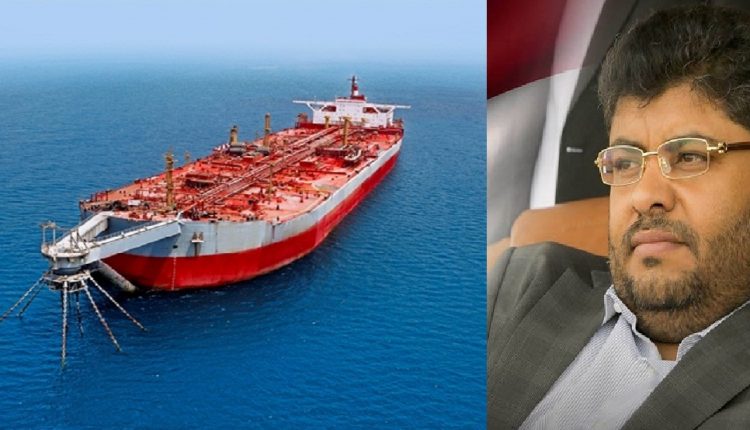Mohammed al-Houthi holds Saudi-led coalition, UN responsible for Safer floating oil reservoir disaster
SANAA, July 28 (YPA) – Mohammed Ali al-Houthi, a member of the Supreme Political Council has blamed the Saudi-led coalition, the United Arab Emirates and the United Nations for any possible future leak in the floating Safer reservoir at Red Sea port of Ras Isa in the western province of Hodeidah.
Al-Houthi warned that disastrous economic and environmental consequences could extend from Suez to Bab al-Mandab.
For four years, warnings from Sana’a as well as regional and international organizations about the dangers of leaking or ignition of some 1.2 million barrels of oil stored in the Safar oil terminal, off the port of Ras Issa in Hodeidah, which has been banned from exporting petroleum by the coalition since the beginning of the war in March 2015.
“The countries of Saudi-led aggression and the United Nations are responsible for any diversion from the floating Safar tank at sea,” Mohammed Ali al-Houthi said in a tweet. “We don’t mind the maintenance of the floating Safar oil tank, it’s what we always demand,” he said.
The warning is an extension of dozens of warnings from the Supreme Political Council and the National Salvation government, along with appeals of the United Nations and international and regional organizations, to pressure the coalition countries to allow the export of the quantities of oil stored in Yemeni reservoirs.
However, the coalition and the Saudi-backed exiled government of Hadi continue to impose a blockade on the reservoir and prevent the export of oil stored inside it or allow the arrival of the gas to operate boiler generators and coolers of the facilities of the floating reservoir, nor the arrival of maintenance teams to prevent potential disaster.
The National Salvation Government have submitted several initiatives to avoid the disaster of “leakage or explosion of the Safar reservoir”, the latest of which in early May, calling on the United Nations to establish a mechanism to sell the oil of the reservoir and supply its revenues equally to the central bank in Sana’a and Aden, in order to pay the salaries of state employees.
“The refusal of the forces of aggression to sell the oil of the Safar tank in Hodeidah in order to pay the salaries of employees is illogical and inhumane,” said al-Houthi in a tweet on Saturday.
Since November 2016, the Saudi-led coalition and the UAE have prevented the supply of necessary diesel fuel to the Safar floating oil reservoir vessel.
The Safar company has confirmed that “diesel steam boilers form the heart of the floating tank Safar, without which all activities will stop.”
The company warned that if the diesel material is not provided, “the company expects a fire or explosion in the steamer Safar, which will lead to unprecedented marine pollution in the Red Sea, and will pose a challenge to Yemen and the countries of the region.”
The Safar company also confirmed the disclaimer of its responsibility and blamed the coalition for “responsibility for the repercussions”.
International reports warn that if the Safar oil reservoir would leak, it “will cover an area of 939 trillion square meters.”\
This means that the effects of the environmental disaster will extend beyond the Red Sea and extend to the nearby seas, according to the Atlantic Council, which issued warnings in mid-April, saying that the ship “turned into a huge bomb that can explode because of its contents and lack of maintenance.”
The center’s report stressed that “inert gases must be injected into the air to ensure that oxygen does not exceed this level of concentration.” It further stressed that the inability of this injection due to the suspension of the tank generators which “makes the tank flammable, and effectively makes it into a giant bomb.”
“A faulty spark or bullet may trigger a devastating explosion of the facility and pipeline, causing destruction in the marine environment in addition to possible human casualties. This will certainly contribute to an economic and humanitarian crisis. The global economy may experience a major disruption in the flow of maritime trade,” the center warned.
“Not only that, the catastrophic effects of the spills or explosion of the floating Safar reservoir oil, would also have tragic humanitarian implications . The world may lose a major area of marine biodiversity, among other consequences,” the report concluded
E.M


